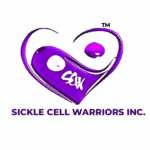This week’s warrior in the spotlight is Brandin Whetstone. Brandin has a great life philosophy and lives every day to the fullest, achieves his goals, is a father, a mentor, plays sports, all even with sickle cell. He is the epitome of a sickle cell warrior.
Let’s start from the beginning. Tell us about your childhood and when you found out you ha sickle cell disease. When I first found out that I had Sickle cell I was 7 years old. When I was born there were no signs of me having sickle cell at all. I was a very active kid. Then one day I was on a ca r ride with my Mom and Dad. I was sitting in the back seat then started to feel really sharp pains in my legs. My parents rushed me to the hospital. I could not stand up or walk. The Doctors had performed lots of tests to try and figure out what my problem was. They thought it was my appendix. So they went ahead and performed surgery to take it out. No luck—I was still feeling pain. At that time I still could not walk. After lots of tests I was diagnosed with a mild form of sickle cell. I had to learn how to walk again which took lots of hard work.
r ride with my Mom and Dad. I was sitting in the back seat then started to feel really sharp pains in my legs. My parents rushed me to the hospital. I could not stand up or walk. The Doctors had performed lots of tests to try and figure out what my problem was. They thought it was my appendix. So they went ahead and performed surgery to take it out. No luck—I was still feeling pain. At that time I still could not walk. After lots of tests I was diagnosed with a mild form of sickle cell. I had to learn how to walk again which took lots of hard work.
I feel lucky to say that after my first episode I did not experience the pain any more throughout my school years. Keeping up with monthly check ups helped a lot.
What was your greatest influence growing up to want to achieve success? My Parents were really good with me growing up helping me with things. They always helped me make right choices. Now that I am older I see why they were always on my case; because they loved me and wanted me to do well. At a young age we all might think they did things to make us mad. Now I am a Behavior Specialist working with young Behavioral teen boys in a residential home.
What does your job entail? A typical day at work for me is just helping clients make good choices and keeping them safe. I also help with life skills to help them become independent. Every day is not the same, there is always something new so that makes my career easy to enjoy. With my job it can bring on a lot of stress and make it easier for a pain crisis. But I don’t let things really get to me to really get me stressed out. I enjoy working with younger guys, I play sports with them and this keeps me very active.
How do your colleagues treat you with sickle cell? Coworkers usually do not know what sickle cell is. I experienced a pain crisis once while working everyone was really helpful. For the ones that do know what sickle cell is would say they would have never known I had it. None treats me any different.
Has sickle cell limited you in any way? How do you cope and reach your goals? Sickle cell has not limited anything in my life. Making sure you’re on top of things helps when I do fall sick. Go to all your checkups, drink lots of water, etc. these all can play a major role. I think having sickle cell has made me a stronger person. Doing things they say I couldn’t or shouldn’t do. That’s what helps me reach my goals.
Do you have regular pain? My pain does not come weekly. As I said I have a mild case that comes. very big gaps— I can go years or months without the pain. But when I do I take Dilaudid (hydrochloride) which really help with the pain.
How is your personal life? I am in a relationship and have 2 kids. Having a girlfriend that’s there for you makes each crisis easy to deal with. I have a son that’s about to turn 5 years old– he was lucky not to have any type of sickle cell. My 18 month daughter is a carrier. I’m very happy that my kids will not have to experience this pain.
What would you tell the 14 year old version of yourself if you could? Anything you would want to tell other sickle cell warriors? I would tell myself to hang in there you have a good life up ahead. For all the warriors keep up to date with checkups and drink lots of water. Keep active to a pace that’s good for you.

Had anyone talked with their family about our shortened lifespan? Do they know your final wishes? I have been extremely sick lately and my daughter asked me if I was going to die. I have always been very open about this topic but wanted to hear how others a 2ddress death and dying. I have experienced friends being very! resistant to denying that there is anything wrong. I found that very frustrating and not supportive. I look f